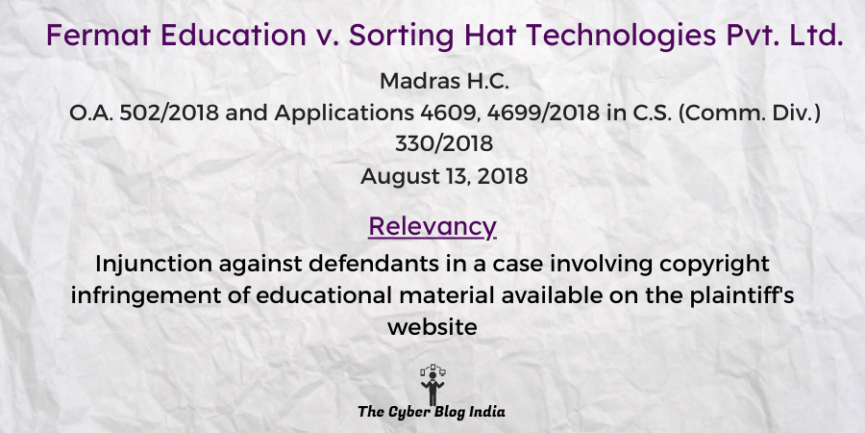Fermat Education v. Sorting Hat Technologies Pvt. Ltd.

Fermat Education v. Sorting Hat Technologies Pvt. Ltd.
In the High Court of Madras
O.A. 502/2018 and Applications 4609, 4699/2018 in C.S. (Comm. Div.) 330/2018
Before Justice C.V. Karthikeyan
Decided on August 13, 2018
Relevancy of the Case: Injunction against defendants in a case involving copyright infringement of educational material available on the plaintiff’s website
Statutes and Provisions Involved
- The Information Technology Act, 2000 (Section 2(1)(w), 79)
- The Copyrights Act, 1957 (Section 52(1)(i))
Relevant Facts of the Case
- The plaintiff, Fermat Education, is an e-learning platform providing coaching classes for CAT. The second plaintiff had exclusively created course materials consisting of question banks and solutions.
- In February 2018, the plaintiff learned that Unacademy had uploaded more than 200 questions and solutions from its free course material on its website.
- Soon after, the plaintiff wrote to the defendant about the infringement, and upon receiving the notice, they admitted it. However, Unacademy did not remove the content from the website. Instead, the defendants offered the plaintiff a sum of ₹5,00,000/- to settle the issue through e-mail.
- The plaintiffs filed a suit seeking an order of permanent injunction to restrain the defendants from infringing or using any materials in any form. They also claimed damages, a decree to remove the materials from the website and a decree to render accounts of the profit earned from the materials and the cost of the suit filed.
- The plaintiffs also filed for an interim injunction to restrain the defendants from uploading the course materials in any form. And the court granted the same.
- The defendants and one of the educators from Unacademy filed applications to set aside the injunction granted, but the court dismissed the applications and refused to vacate the injunction in force.
Prominent Arguments by the Advocates
- The plaintiff’s counsel argued that the plaintiffs have proprietary rights to the materials; hence, the defendant cannot claim protection under Section 52(1)(i) of the Copyrights Act, 1957. The defendant also admitted to the infringement in the correspondence e-mail. The first defendant is not an intermediary according to the terms and conditions of the website and also as defined under Section 2(1)(w) of the Information Technology Act, 2000. Hence, it cannot claim protection under Section 79 of the Information Technology Act, 2000.
- The defendant’s counsel submitted that the first defendant claimed protection under section 52(1)(i) of the Copyrights Act, 1957, as they reproduced the material for the purpose of education. The first defendant is an intermediary under Section 2(1)(w) of the Information Technology Act, 2000, and they had no obligation to examine the material uploaded.
Opinion of the Court
- The defendants do not qualify for exemption under Section 52(1)(i) of the Copyrights Act, 1957, as consideration was taken and was thus a business venture.
- Moreover, the defendant does not fall under the definition of intermediary under Section 2(1)(w) of the Information Technology Act, 2000. The uploaded material was per the defendant’s discretion and an obligation to ensure non-infringement existed.
Final Decision
- The court granted an ad interim temporary injunction against the defendants.
Adyasha Sahoo, an undergraduate student at the Institute of Law, Nirma University Ahmedabad, and Arnav Kaman, an undergraduate student at Rajiv Gandhi National University of Law, Punjab, prepared this case summary during their internship with The Cyber Blog India in January/February 2024.
